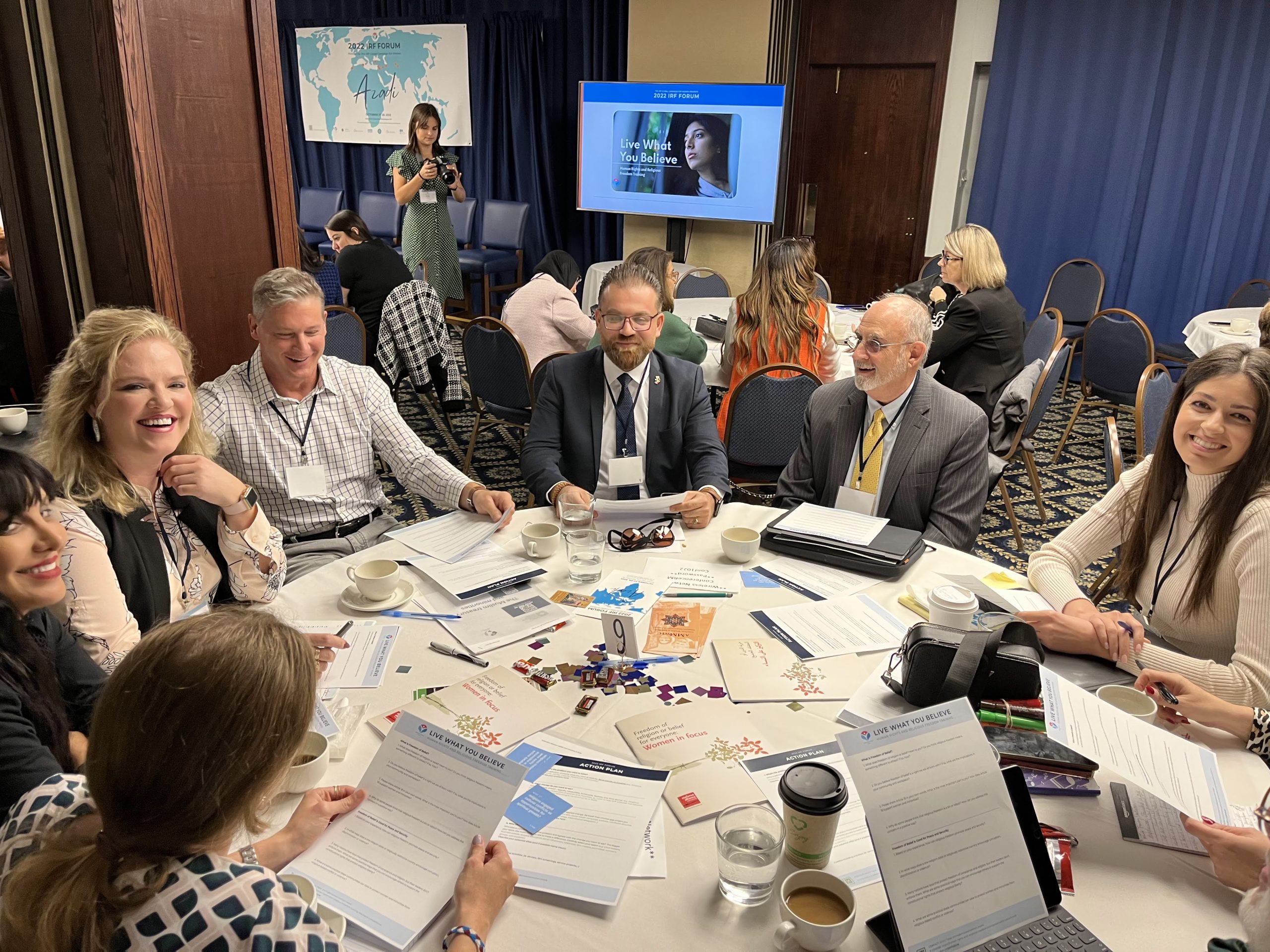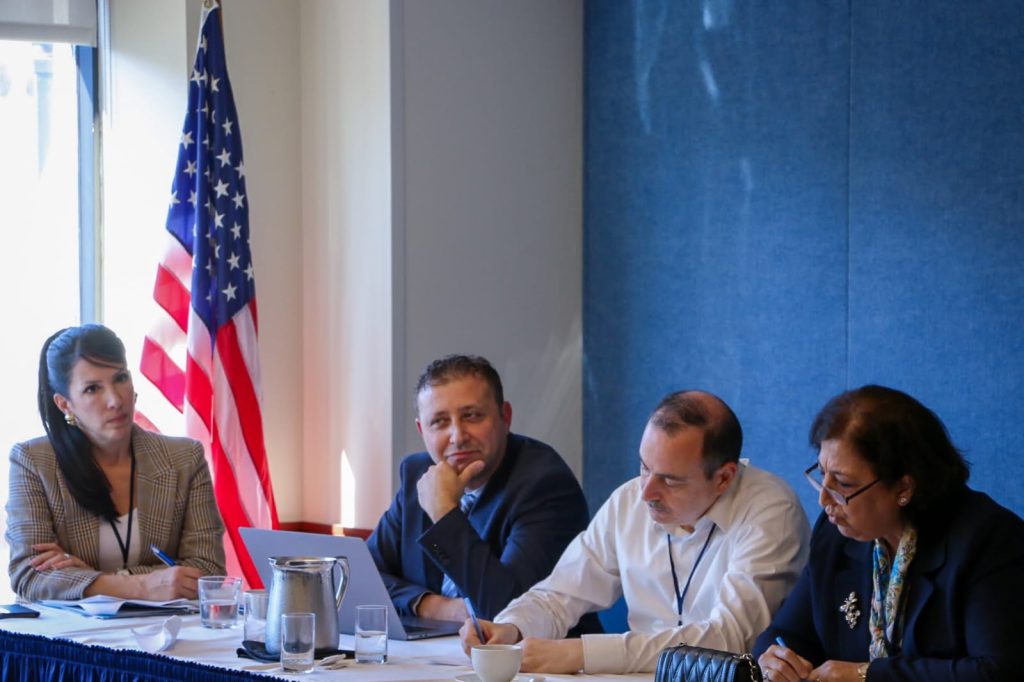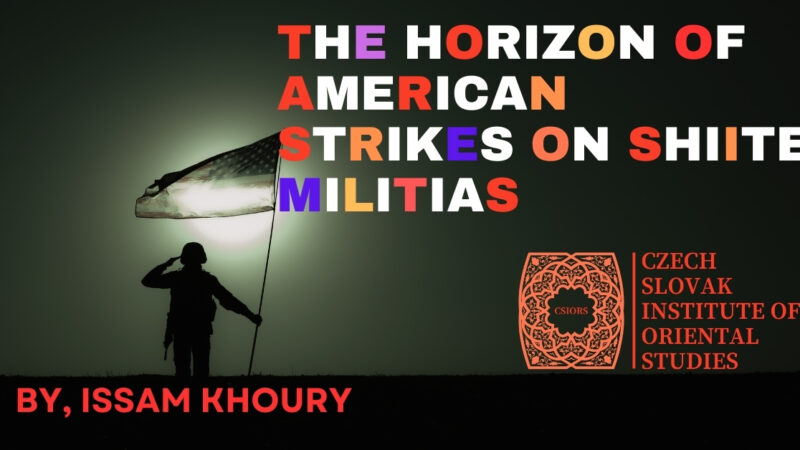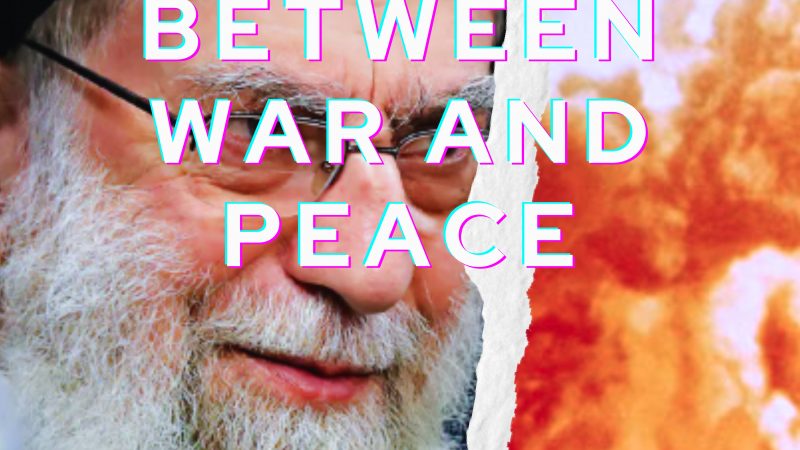2022 IRF Forum

By, Issam Khoury
Center for Environmental and Social Development
Oct 2022
“Azadi”, or freedom in Persian, was present at the International Religious Freedom Forum, which was held at the Press Club in Washington, DC, on October 27-28, 2022. The meeting brought together intellectual and academic personalities and civil society activists to discuss opportunities for developing the reality of religious freedoms. in the world, and the Middle East region.
This conference coincided with the incidents of excessive violence, which affected Iranian women and girls, from the ruling system of Islamic law in the Islamic Republic of Iran, which made the presence of Iranian women overwhelming.
Certainly, the files of the social changes that took place after the Taliban dominated the government in Afghanistan, the growing Shiite-Sunni conflict in the regions of Iraq and Syria, the increasing repression of journalists in Turkey, and the absence of a sane government in the State of Lebanon were present in the meeting. which focused on issues of promoting equality between Gender, peacebuilding, and religious freedom in several countries, the most important of which are (Pakistan, Afghanistan, Iran, Iraq, Syria, Lebanon, Turkey, Tunisia, and Morocco)
The discussions stemmed from the main principle since religious freedom is an integral part of the concept of public freedom, which does not succeed in the absence of a democratic system of government.
From here were the speeches of the attendees at the conference, and the explanatory human rights videos that were produced by Empower Women Media are very important to clarify issues such as rape, violence against women, temporary marriage, and other issues that destroy societies under the dominance of patriarchal thought, and the marginalization of religious advocates of the central role of women in creating a successful family institution.
Shirin Taber[1], the coordinator of this meeting explained that the aim of the conference is to enhance networking among human rights activists and to provide the attendees with training tools that enable them to spread the values of religious freedom in the societies from which they came.
Dr. Katrina Lantos Swett[2], Director of the Lantos Foundation, explained that religious freedom requires the promotion of women’s freedom to create dynamic and evolving societies.
Syrian meetings at the conference:
The diverse ethnic and religious presence of the Syrians participating in the meeting was remarkable, which prompted them to organize two workshops over the course of the conference.
First workshop
Speakers: Sinam Mohamed, Ayman Abdel Nour, Issam Khoury // Session moderator: Astrid Hajjar
Oct 27, 2022

Sinam Mohamad[3] in her speech focused on the need for one to exercise his religious and ideological freedom in any part of the world, then dealt with the ethnic and religious violations that were carried out by parties affiliated with the Turkish government towards the Yazidi and Alawite religious minorities in the Afrin region, and against the Syriac and Assyrian Christians in the Ras al-Ayn.
She indicated that the Autonomous Administration of North and East Syria has striven to prevent the expansion of these violations to areas beyond that, and despite its recent experience, this administration has been able to achieve a distinguished level of religious freedom in the areas under its authority and has also succeeded in empowering women to play a leadership role. The percentage of women’s representation reached 50% in various political, social, economic, and even military sectors, and of course, this percentage was not achieved under the authority of the Syrian regime.
The journalist and politician, Ayman Abdel Nour[4], addressed in his speech the mechanisms of the Syrian regime that strengthened the state of differentiation between minorities and presented many examples which exposed that the regime was not a defender of Syrian Christians and explained the methods of manipulation used by the regime to blackmail minorities and as barter cards with religious leaders in various countries, in the end, the speech presented the Syrian state as a farm in the grip of the ruling family.
The writer and researcher, Issam Khoury[5], dealt in his speech with the extent of the Levantine man’s attachment to the word of God, considering his presentation of it as part of the habit and not as a religious duty, and explained that the Syrians under bombardment were constantly appealing to God to save them from the tyrant Bashar al-Assad, but that did not happen, which prompted Many of them to view God as a mythical and unrealistic situation, so the number of atheists and non-believers has grown, to become today in Syria a wide range that no one talks about.
Then he touched on the Alawite[6] sect, which he divided into two main divisions[7], namely:
- Al-Kalazia: It is a group of clans that benefited from Hafez Al-Assad and distributed to its sons the most important military and security jobs.
- Al-Haydariyyah “Al-Makhaws”: This is the Alawite group that did not obtain privileges and influential positions, which made many of them oppose the government.
And he indicated that the Syrian regime, terrified of the March revolution in 2011, fueled the fears of the Haidarites, the “Machos”, by carrying out sectarian massacres against their villages by radical Sunni extremist groups who had been released from prisons, which prompted them to arm themselves to defend themselves, which made it easier for Assad. The process of recruiting them to become a sectarian militia supporting the army.
Khoury adds that al-Assad sought to recruit Christians in the same way, but Christians do not have a geographical concentration as it is among the Alawites and Druze, so most families preferred to smuggle their children out of Syria, so that they would not be victims of a sectarian war to which they are not a party, hence the decrease in the number of Christians from two million in 2011 to 700K Christians in 2022.
While the Druze integrated into the regime’s army during the first period, but after the killing of many of them, they decided to retreat to compulsory service within their regions, which caused great differences between them and the ruling regime in Damascus, which made the Druze-dominated As-Suwayda area a region with a different specificity from the areas affiliated with the Syria, which prompted Khoury to show that Syria is a country divided into five states, and he identified these five states in two studies distributed to the audience produced by the Czech-Slovak Institute of Oriental Studies[8], namely:
He also explained how citizens in regime areas were evaluated based on the level of loyalty to the ruler:
| Citizenship level | Sect |
| First-Class Citizen | An officer, or a relative of an official of the Alawite sect |
| Second-Class citizen | Alawite pro for al-Assad |
| Third-Class citizen | loyal to minorities (Druze, Ismaili, Christian) |
| Fourth-Class citizen | Sunni pro for al-Assad |
| Fifth-Class citizen | Moderate exhibitions of “Alawite” |
| Sixth-Class citizen | Moderate opposition from minorities “Christian, Ismaili, Druze” |
| Seventh-Class citizen | A moderate Sunni opponent, or critic of some practices |
| lack of the citizenship | An opponent who is openly critical of the president, or criticizes first-class citizens |
The second workshop
Speakers: Bassam IshaK, Saleh Saleh (alias: Aram Al Domani), Zaher Baadarani// Session moderator: Astrid Hajjar
Oct 28, 2022
Bassam Ishak[11]: In his speech, he explained part of his life’s journey inside Syria, which grew between the human rights struggle and the political work that resulted in a series of security harassments that even prevented him from traveling from Syria. The generality of these data was Ishak’s means, who is the son of Said Ishak[12], “one of the heads of the Syrian government, although he is of Christian origin,” to explain through him the state of oppression experienced by the Syriac minority under the al-Assad family, this minority from which the name of the Syrian state came, and yet this minority was subjected to Political marginalization and economic constraints pushed the majority of its youth to emigrate from the Syrian homeland.
Ishak, one of the leaders of the US mission office of the Syrian Democratic Council in Washington, was keen to describe the sectarian diversity of the Syrian Jazira region, emphasizing the fears of the Syriac community and the general Christians of Hasakah of a wider wave of displacement considering the expansion of groups supported by the Turkish government into the regions of northeastern Syria. He also spoke about the experience of establishing the Autonomous Administration model in northeastern Syria and the importance of the social contract, which Syriacs and Assyrians from the region contributed to writing, distinguishing respect for the choice of faith, equality between men and women recognition of cultural diversity and cultural rights for all national components. He explained the importance of relying on such values in the political construction of the future Syria, with the aim of reaching a Syria that respects and guarantees the dignity and rights of all Syrians, individuals, and groups.
Professor Zaher Baadrani[13]: In his speech, he explained that the ruling regimes in the Middle East suffer from the phenomenon of sectarianism, even if they claim secular thought, and he gave an example of the Arab Socialist Baath Party, which was ruled in Iraq by the Sunni minority that oppressed the Shiites, and the Arab Socialist Baath Party in Syria, in which the minority Alawites practiced the gained control over the Sunni majority in the country. So, the minorities in both countries appeared as groups that were superior to the majority of the People. These two examples were a window for Baadrani to clarify that the idea of ignoring religion and its influence in constitutions is unrealistic considering the influence of religion on the eastern mentality.
Saleh Saleh[14]: He explained in his speech that the Syrian state, with its ethnicities and sectarian diversities, was an example of cultural, social, and political coexistence, until the arrival of the Arab Socialist Baath Party, which created a new religion whose mission was to deify the president and his family, by including the sayings of Hafez al-Assad in schools and universities and calling his name on religious education houses. and cultural. Then Saleh expanded on describing the Syrian regime as an institution that sponsors terrorism, citing that this regime sent dozens of jihadists to fight in Iraq after 2003, and at the outbreak of the Syrian revolution, this regime sent hundreds of terrorists from southern Syria towards the As-Suwayda desert with the aim of intimidating the Druze community and forcing it to take up arms. besides the system. Saleh’s speech clearly showed that the Syrian people are religious, but not extremist.
The 2022 IRF Forum, carried serious directions for holding a new meeting next year in the Middle East region, and it is likely that its destination will be Morocco, or Jordan, with the aim of mobilizing and motivating the largest number of organizations in the MENA Region to engage in this lofty goal.
[1] Shirin Taber is the executive director of Empower Women Media and the author of Muslims Next Door (Zondervan/Harper Collins). The Los Angeles Times, Detroit Free Press, Seattle Times, Fox News, Christianity Today,
NewYorkTimes.com, and Religion News have featured her work to support peace-building, women’s empowerment, and multi-faith living. She has partnered with the George Bush Institute Women’s Leadership Initiative, the United Nations Office for Genocide Prevention, and the Religious Freedom & Business Foundation to produce media projects focused on women’s rights and religious liberty. Also, she is the co-chair of the Media and International Religious Freedom Roundtable (IRF Secretariat) . Shirin earned a BA in Literature and two master’s degrees in Intercultural Studies. For more information, go to:
www.empowerwomen.media and https://human-rights-and-religious-freedom-training.teachable.com/p/home
[2] Dr. Katrina Lantos Swett serves as President of the Lantos Foundation for Human Rights and Justice, she is the former Chair and Vice-Chair of the United States Commission on International Religious Freedom (USCIRF) and teaches Human Rights and American Foreign Policy at Tufts University. She currently serves as Co-Chair of the Board of the Committee for Human Rights in North Korea (HRNK) and the Budapest based Tom Lantos Institute. Dr. Lantos Swett also serves on the Advisory Board of UN Watch, the annual Anne Frank Award and Lecture, and The Warren B. Rudman Center for Justice, Leadership, and Public Policy.
[3] Sinam Mohamad is Chief of the US Mission of the Syrian Democratic Council in Washington DC and the top diplomat of the AANES “Autonomous Administration of NE Syria”. She is also a member of the Presidential Council of the SDC, served as the European representative of the AANES, and who has been a leading advocate for women’s rights and democracy in Syria.
[4] Ayman Abdel Nour is a noted Syrian reformist, the editor-in-chief of All4Syria (Syria’s leading independent news outlet), and the president of the non-profit Syrian Christians for Peace. Ayman is trained as an engineer and economist. He has testified in front of the European Parliament and received numerous awards. Mr. Abdel Nour has provided consulting services on Middle East public policy to a variety of international organizations (such as UN and EU) and has been widely quoted in some of the most important publications in the international media, including the Washington Post, the Los Angeles Times, the New York Times, CNN.com, MSNBC.com, USA Today, Christian Science Monitor, Time.com, FOX, Reuters, the Financial Times, Wall Street Journal, Bloomberg, Le Monde, Le Figaro, and BBC News. He has lectured widely at prestigious universities, including Columbia University’s Middle East Institute at the School of International and Public Affairs in New York, Tufts University Cabot Intercultural Center, Paris Institute of Political Studies (Sciences Po), Yale University, the University of California, Los Angeles International Institute Center for Middle East Development.
[5] Issam Khoury is a journalist and political activist from Syria with over 20 years of experience writing and conducting research for mainstream news media in the Middle East and North Africa. He is the author of three books in Arabic and “Assad and the ME” in English and has written more than 700 reports on politics, governance, Islamic groups, human rights, culture, and the arts, and is an expert on political and social trends. and personalities. He is also the first journalist to report on the revolution, while still in Syria. Khoury is an expert on social media and has trained journalists from all over the Arab world in this matter. In 2016, he was a senior advisor to Strategy XXI Partners in New York, then in 2017 he founded the Center for Environmental and Social Development, a 501(c)(3) international human rights organization based in New York. Khoury earned a Master of Geopolitical in 2008 and was an international journalist fellow at the CUNY J-school in New York in 2015 and in 2022 he received a master’s degree from the Quantic School of Business and Technology.
[6] Research: Religion in the Nusayri “Alawi” sect, By Issam Khoury, 2008:https://issamkh.com/2016/12/24/religion-in-the-nusayri-sect/
[7] Research: Al-Nuseyriyeen “Alawites”:Between politics and clan life, By Issam Khoury, 2008: https://issamkh.com/2016/12/24/research-al-nuseyriyeen-alawitesbetween-politics-and-clan-life/
[9] https://www.csiors.org/en/post/federalism-between-realism-and-minorities-in-syria
[10] https://www.csiors.org/en/post/policy-paper-the-muslim-treasury-and-minorities
[11] Bassam Ishak, founder of the Syriac National Council of Syria, and a member of the Presidential Council and the representative office of the Syrian Democratic Council in Washington. He contributed to the establishment of the Syrian National Coalition in 2012, and the Syrian National Council in 2011, and held the position of Executive Director of the Swasia Organization for Human Rights in 2003. Ishak holds a master’s degree in managing political and ethnic conflicts in 2009 from the Royal Canadian University.
[12] Saeed Ishak, Acting President of the Syrian Arab Republic for several days in 1952. He was also the secretary of the Syrian National Bloc at the time of independence, and a former deputy in the Syrian parliament from 1932 to 1954. He held the position of the first deputy to the House of Representatives in several parliamentary sessions.
[13] Zaher Baadarani, president of Syrian Future Movement (SFM), and Founder and Director of Tawad Inc in Florida, also, he is the owner of Al Ihssan LLC for Educational Services and Academic Research. Baadarani has a Ph.D. in the renewal of Islamic discourse in the media.
[14] https://www.annahar.com/arabic/article/302033-%D8%B1%D8%AD%D9%84%D8%A9-%D9%86%D8%A7%D8%B4%D8%B7-%D8%B3%D9%88%D8%B1%D9%8A-%D9%85%D9%86-%D8%AF%D9%88%D9%85%D8%A7-%D8%A5%D9%84%D9%89-%D9%88%D8%A7%D8%B4%D9%86%D8%B7%D9%86-%D9%85%D8%A7%D8%B0%D8%A7-%D9%82%D8%A7%D9%84-%D9%84%D9%84%D8%A7%D9%85%D9%8A%D8%B1%D9%83%D9%8A%D9%8A%D9%86


